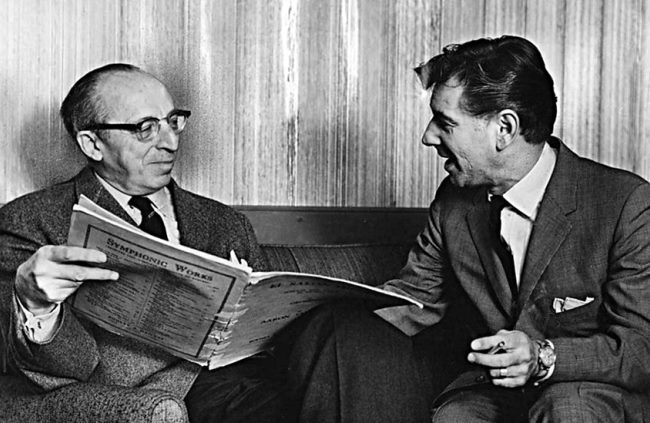Aaron Copland, Canticle of Freedom
by Byron Adams
Born November 14, 1900 in Brooklyn, New York
Died December 2, 1990 in North Tarrytown, New York
Composed in 1955
Premiered in 1955 at Kresge Auditorium, Cambridge, Massachusetts
Performance Time: Approximately 13 minutes
On May 26, 1953, Aaron Copland appeared before the Senate Permanent Subcommittee on Investigations. Senator Joseph McCarthy (R-Wisconsin) chaired the committee; the committee’s infamous chief counsel Roy Cohn was present. The anti-Communist crusader McCarthy called Copland to testify about his left-wing political convictions. Earlier that year, a right-wing congressman, Representative Fred Busbey, had agitated successfully to remove Copland’s A Lincoln Portrait from President-elect Eisenhower’s inaugural concert.
The stakes could not have been higher for Copland: just being summoned before McCarthy and his Redbaiting committee had an adverse though temporary effect on Copland’s career. Worse, the committee had the power to charge and imprison witnesses that they found recalcitrant. Although Roy Cohn aggressively tried to entrap him into admitting that he was a Communist “sympathizer,” Copland replied to such questions with calm dignity and refused to “name names” of his supposed associates. Both McCarthy and Cohn were completely ignorant about classical music; they had no idea of Copland’s international fame or his accomplishments. After the hearing, Copland jotted down some of his thoughts about McCarthy: “He is like a plebeian Faustus who has been given a magic wand by an invisible Mephisto—as long as the menace is there, the wand will work.” Fortunately for Copland, he was not recalled for further testimony before the Subcommittee.
Copland’s Canticle of Freedom, which was commissioned by MIT for the dedication of Kresge Auditorium, was completed in 1955. It was a direct, dignified, and noble response to McCarthy’s demagoguery. Copland’s biographer, Howard Pollack, has observed that this score “stared McCarthyism squarely in the face.” Canticle of Freedom is scored for orchestra and chorus. Copland cast the piece in a tripartite form similar to that of A Lincoln Portrait, with chorus instead of a narrator announcing the final section. The text comes from an epic poem by the fourteenth-century Scottish poet John Barbour (c. 1320–1395). When the chorus enters, it becomes clear that the dynamic rhythmic pattern with which Canticle of Freedom begins has its origin in the word “freedom” itself, so that both the rhythm and the concept of freedom pervade this stirring score.
Byron Adams is a Professor of Musicology at the University of California, Riverside.

